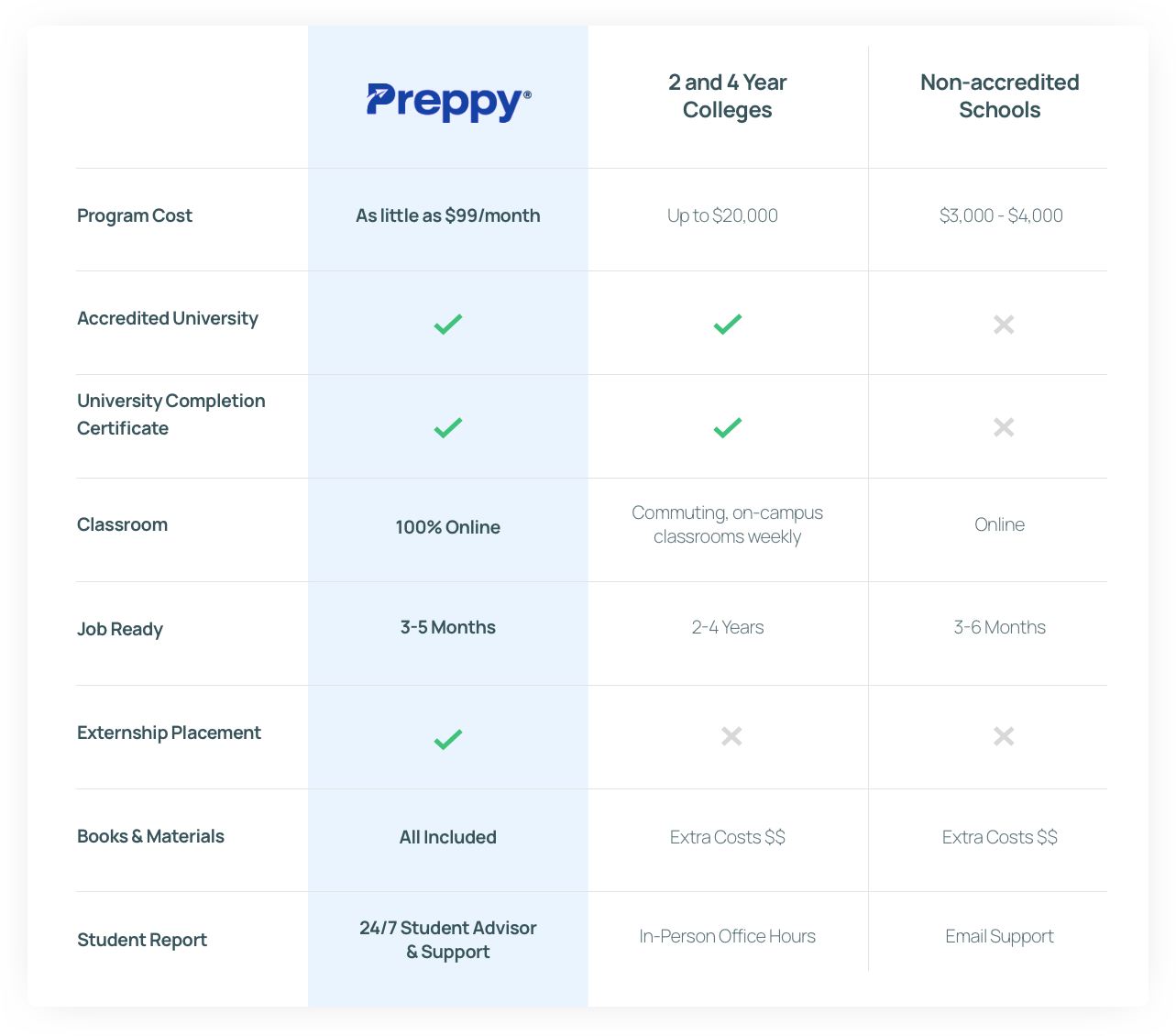Becoming a Certified Ethical Hacker is Now Easier than Ever
Becoming a Certified Ethical Hacker is Now Easier than Ever
Our certification program gets you job-ready faster, cheaper, and completely online.




WHY WE LOVE
Ethical Hacker


-
Growing industry demand
-
Exciting work
-
Get certified within months
-
Transferable skills
-
Flexible work environment
Starting Towards Your Career as a Certified Ethical Hacker Is Now Possible


100% ONLINE
No textbooks, no classrooms, no schedules.
Online simulators and cutting-edge training get you job-ready faster and more effectively. You can even learn from your mobile phone.


100% ONLINE
No textbooks, no classrooms, no schedules.
Online simulators and cutting-edge training get you job-ready faster and more effectively. You can even learn from your mobile phone.

EXTERNSHIP OPPORTUNITY
Hands-On Training & Experience
Preppy isn’t just about top education…you're also eligible for an Externship with a local IT or computer company so you could gain valuable hands-on experience in ethical hacking and apply what you've learned.



EXTERNSHIP OPPORTUNITY
Hands-On Training & Experience
Preppy isn’t just about top education…you're also eligible for an Externship with a local IT or computer company so you could gain valuable hands-on experience in ethical hacking and apply what you've learned.

FASTER COMPLETION
Finish in as little as 4 months.
Instead of ethical hacking schools or training programs that can take up to 2 years, you’ll be ready to start towards your career ASAP.

FASTER COMPLETION
Finish in as little as 4 months.
Instead of ethical hacking schools or training programs that can take up to 2 years, you’ll be ready to start towards your career ASAP.


ACCREDITED UNIVERSITY
World-Class Education
Unlike other programs, you'll have the confidence that comes with a 150 year-old accredited nonprofit university

ACCREDITED UNIVERSITY
World-Class Education
Unlike other programs out there, you’ll have the prestige that comes with a 150 year-old accredited nonprofit university



UNIVERSITY CERTIFICATE
Go Ahead…Brag A Little
Proudly hang this respected accredited university certificate on your wall in your home or shop


UNIVERSITY CERTIFICATE
Go Ahead…Brag A Little
Proudly hang this respected accredited university certificate on your wall in your home or office

LAPTOP INCLUDED
Yep, we provide you a laptop
We make sure you have all the tools you need to be successful. Just select the applicable program option when you register.


INSANELY AFFORDABLE
Industry-low pricing for everyone
Easy payment plans...and no student debt. Your hard earned money can go towards the better things in life.


LAPTOP INCLUDED
Yep, we provide you a laptop
We make sure you have all the tools you need to be successful. Just select the applicable program option when you register.
INSANELY AFFORDABLE
Industry-low pricing for everyone
Easy payments & no student debt. Your hard earned money can go towards the better things in life.
And Your Success Means Everything

CAREER AND RESUME SUPPORT
You get access to our career platform, where companies post ethical hacking jobs, and you can get resume support. All included.

24/7 LEARNER SUPPORT
Dedicated course advisors to help you through the whole process...whenever you need it.

CAREER AND RESUME SUPPORT
You get access to our career platform, where companies post jobs, along with resume support. All included

24/7 LEARNER SUPPORT
Dedicated course advisors to help you through the whole process...whenever you need it.
Real Student Stories

“The convenience and user ease of this program is outshined only by your customer/student support…I could not be happier with my experience, I will be singing your praises indefinitely.”

"I will recommend this program to everyone...the instructor in the video is the best. This program is designed for everyone to win and be confident in their new career!!!

“I truly loved being in this course!”


"I will recommend this program to everyone...the instructor in the video is the best. This program is designed for everyone to win and be confident in their new career!!!

“I truly loved being in this course!”

Ethical Hackers are Essential for Cybersecurity
Why We Love Cybersecurity

“Ethical Hackers act as the silent guardians, ensuring online security and data protection…which makes them heroes of digital security.”
- Grant Aldrich, Founder & CEO Preppy

Ethical Hackers are Essential for Cybersecurity
Why We love Healthcare

In the cybersecurity industry, the demand for jobs is on the rise. According to the statistics and reports by the U.S. Bureau of Labour Statistics, cybersecurity is projected to experience significant growth in employment over the next decade, with an estimated 32% overall increase, resulting in approximately 17 thousand new positions.
This is a significantly faster increase than other professions, proving how bright the future looks for cybersecurity professionals.
Also, the market for cybersecurity tools and services is forecasted to exceed $40 billion in value. This growth is driven by the increasing need for strong online security measures as more people rely on digital platforms for various activities.
As more and more people use the internet and do things online, we need to work even harder to keep everything safe and secure. As online threats continue to evolve, the demand for skilled professionals in the field, such as ethical hackers and security analysts, is rising.
What is the earning potential for cybersecurity professionals?
According to the BLS.gov, the median income for cybersecurity experts is around $112,000 per year or roughly $53.85 per hour. These numbers show that working in the cybersecurity field can be a well-paying and promising career.
This is a significantly faster increase than other professions, proving how bright the future looks for cybersecurity professionals.
Also, the market for cybersecurity tools and services is forecasted to exceed $40 billion in value. This growth is driven by the increasing need for strong online security measures as more people rely on digital platforms for various activities.
As more and more people use the internet and do things online, we need to work even harder to keep everything safe and secure. As online threats continue to evolve, the demand for skilled professionals in the field, such as ethical hackers and security analysts, is rising.
What is the earning potential for cybersecurity professionals?
According to the BLS.gov, the median income for cybersecurity experts is around $112,000 per year or roughly $53.85 per hour. These numbers show that working in the cybersecurity field can be a well-paying and promising career.
“Ethical Hackers act as the silent guardians, ensuring online security and data protection…which makes them heroes of digital security.”
- Grant Aldrich, CEO & Founder Preppy
WHAT'S WAITING FOR YOU INSIDE
Preppy’s Ethical Hacker Certification Program

WHAT YOU'LL LEARN
- Understanding the Role of Ethical Hacking: Responsibilities and Duties of the Cybersecurity Department
-
Understanding the Networking and Security Foundations
-
Networks: Learning the steps & protocols involved in scanning networks
-
Understanding Footprinting and Reconnaissance
-
Learning the process of System Hacking as per Cybersecurity Protocols
-
Understanding the concepts of Malware and Sniffing
-
Differentiating between Attack and Defense
-
Understanding the role of social engineering & implementing safety measures to prevent cyber-attacks & data leaks.
-
Understanding of the network attacks and developing security for wired and wireless networks
-
Understanding the the security architecture of a system, the design & protocols involved.
-
and much much more!
WITH PREPPY
You’re Ready for the Certification
After completing this Ethical Hacking training program, you'll have the opportunity to take the leading national/industry-recognized certification exam(s) essential to employment in this fast-growing field.
You're ready for them all!

Certified Ethical Hacker (CEH)
Certified Ethical Hacker (CEH)
EC-Council's Certified Ethical Hacker has become the fastest growing certification in the security industry. Once you complete your program with Preppy, you'll be ready to crush the CEH exam and receive this certification after your experience requirements.
EC-Council's Certified Ethical Hacker has become the fastest growing certification in the security industry. Once you complete your program with Preppy, you'll be ready to crush the CEH exam and receive this certification after your experience requirements.
JUST IN CASE
If You're Still on the Fence

30 Day Money Back Guarantee
30 Day Money Back Guarantee
Preppy's certification training programs are all backed by our industry-leading 100% guarantee. If you're unhappy for any reason, you can cancel within 30 days to receive a full refund. That's how confident we are in our best-in-class offering, and that you'll love the Preppy difference.
Preppy's certification training programs are all backed by our industry-leading 100% guarantee. If you're unhappy for any reason, you can cancel within 30 days to receive a full refund. That's how confident we are in our best-in-class offering, and that you'll love the Preppy difference.


Preppy Gets the Job Done
- 100% Online
-
No Textbooks, No Classrooms, No Schedules
-
Hands-On Training & Experience with Included Externship
-
Get certified in as little as 4 months
-
An exciting and rewarding career
-
No student debt
No Sales People.Get started today & learn in just minutes.
No Sales People.Get started today & learn in just minutes.
AND NOW YOU WONDER
What Makes Preppy Unique?

AND NOW YOU WONDER
What Makes Preppy Unique?
Other college programs can cost up to $20,000...Not Preppy.

EXCLUSIVE BONUS
Externship Placement


Hands-on training & work experience… All included
When you finish your Preppy Ethical Hacker program online, you're eligible for a volunteer Externship with a local company or organization to gain valuable hands-on training and experience in the field. During your program, a Preppy Externship Coordinator will reach out to coordinate your placement for you.

About Us
Our team of academics and startup veterans are making Certification and career training affordable for everyone.
In partnership with Auburn University, Office of Professional & Continuing Education, Preppy is making it simple, easy, and affordable to get the skills you need for that dream career. World-class education without sales people, the big price tags, or inconveniences.
We’re now one of the largest offerings of online and immersive certification programs in the country.
Our Founder
Preppy was founded by higher education expert, Grant Aldrich, who’s been featured in Forbes, American Express, Business Insider, Bloomberg, and hundreds of other outlets for his work to make education affordable for everyone.



About Us

Our Founder
Preppy was founded by higher education expert, Grant Aldrich, who’s been featured in Forbes, American Express, Business Insider, Bloomberg, and hundreds of other outlets for his work to make education affordable for everyone.

GET STARTED TODAY
Pricing Options
50% Off
Best Value
$1899
1 PAYMENT
- Laptop Included!
-
No Additional Fees
-
All Materials Included
-
1 Payment
-
No Interest
-
24/7 Learner Support
-
Certificate of Completion
-
Money Back Guarantee

- Secured and protected checkout.
FREQUENTLY ASKED QUESTIONS
Answers to Your Questions:
Are there any admissions requirements for the Ethical Hacking training program?
We do not require any previous working experience! Our only enrollment requirement is that you have either completed or are in the process of completing a GED or a high school diploma. That’s it, and you can start your program today. However, to receive the CEH certification from EC-Council, you will be required to not only pass the exam but have 2 years of experience working in the field. The included Externship will begin to apply towards that requirement.
What does upward mobility look like for Ethical Hackers?
Upward mobility is one of the most significant aspects aspirants look for when choosing Ethical Hacking. They usually begin their careers with entry-level positions, with titles such as ‘Junior Security Analysts’ or ‘Penetration Testers.’
In these roles, they gain hands-on experience in identifying vulnerabilities and assessing cybersecurity measures. Once they gain enough knowledge and expertise, they can advance to mid-level positions, such as ‘Security Consultants’ or ‘Senior Penetration Testers.’ Here, their responsibilities include more complex security assessments and project management.
As they gain experience and demonstrate their expertise, ethical hackers have the potential to advance their careers into senior or leadership roles. These positions, like senior security architects or security managers, often involve responsibilities like supervising teams, formulating security strategies, and collaborating closely with an organization's leadership to establish strong security policies and protocols.
Additionally, ethical hackers can choose to specialize in specific domains of cybersecurity, such as network security, application security, or cloud security. Specialization can open doors to more lucrative and prestigious positions, including certifications like certified ethical hacker (CEH) or certified information systems security professional (CISSP).
So, ultimately, the journey toward upward mobility in the field of ethical hacking is signified by an ongoing commitment to learning, obtaining professional certifications, and demonstrating an ability to adapt to the constantly evolving landscape of cybersecurity.
In these roles, they gain hands-on experience in identifying vulnerabilities and assessing cybersecurity measures. Once they gain enough knowledge and expertise, they can advance to mid-level positions, such as ‘Security Consultants’ or ‘Senior Penetration Testers.’ Here, their responsibilities include more complex security assessments and project management.
As they gain experience and demonstrate their expertise, ethical hackers have the potential to advance their careers into senior or leadership roles. These positions, like senior security architects or security managers, often involve responsibilities like supervising teams, formulating security strategies, and collaborating closely with an organization's leadership to establish strong security policies and protocols.
Additionally, ethical hackers can choose to specialize in specific domains of cybersecurity, such as network security, application security, or cloud security. Specialization can open doors to more lucrative and prestigious positions, including certifications like certified ethical hacker (CEH) or certified information systems security professional (CISSP).
So, ultimately, the journey toward upward mobility in the field of ethical hacking is signified by an ongoing commitment to learning, obtaining professional certifications, and demonstrating an ability to adapt to the constantly evolving landscape of cybersecurity.
Is the Ethical Hacker course program during scheduled hours during the week?
Will I need to pay for any textbooks?
No! This ethical hacking program does not include any extra charges or costs for textbooks or any kind of learning resources, unlike other schools. When students enroll, you will be sent digital copies of any network tech material that you will need for the course program.
What if I'm unhappy with the program but after enrolling?
Don’t worry! Our ethical hacking training program is funded by industry-leading 30-day money-back guarantee. If you are unsatisfied with the training program for any reason, simply cancel and receive a refund. It's that easy!
Which organization will I be taking my Ethical Hacking certification training program with?
Preppy, a career affordability organization has partnered with the Auburn University Office of Professional and Continuing Education to offer this hacking training program. Preppy brings certification programs that are completely online as well as affordable. On successful completion of the training program, you also receive a certificate of completion from the university to make you feel proud of your achievements as well as something for decorating your office or home wall.
What kinds of classes will I be taking to prepare for my Ethical Hacker certification?
To prepare for an Ethical Hacker certification, you will typically take a series of courses that cover various aspects of cybersecurity, penetration testing, and ethical hacking techniques.
These include foundational concepts in Ethical Hacking, Networking, and Security. You'll progress through areas such as reconnaissance, network scanning, system hacking, and understanding and countering malware, among others. These courses provide you with the skills needed to identify vulnerabilities and protect against various digital threats. You will also explore advanced subjects such as Social Engineering, Wireless Security, Cryptography, and Security Architecture and Design. With Preppy, you’re ready to crush the CEH certification exam.
Preppy’s program is designed to equip you with the knowledge and expertise to secure networks and systems effectively, laying the foundation for a successful career in ethical hacking and cybersecurity.
These include foundational concepts in Ethical Hacking, Networking, and Security. You'll progress through areas such as reconnaissance, network scanning, system hacking, and understanding and countering malware, among others. These courses provide you with the skills needed to identify vulnerabilities and protect against various digital threats. You will also explore advanced subjects such as Social Engineering, Wireless Security, Cryptography, and Security Architecture and Design. With Preppy, you’re ready to crush the CEH certification exam.
Preppy’s program is designed to equip you with the knowledge and expertise to secure networks and systems effectively, laying the foundation for a successful career in ethical hacking and cybersecurity.
Is my externship included as part of the ethical hacker program?
Yes because at Preppy, we understand you need more inclusive training to be prepared for your career and we make sure you have the practical experience needed. As part of our program, we have externship specialists that help find volunteer positions for you as you closer to finishing your program. Hacking professionals are needed to help secure critical infrastructure and enterprises. There are also consulting firms that work for other institutions or businesses for security purposes. These all provide plenty of opportunities for volunteer positions adding experience which will be an exceptional addition to your learning, and a resume builder as well!
How long will I have access to complete my program?
You’ll have full online access for 1 year to complete your program. All of the courses and lessons are self-paced, and can be completed as quickly as you’d like! If you need more time for any reason, you can always contact us to request an extension. We’re here for you!
Does my included externship include a salary?
The valuable hands-on experience with your externship is volunteer work, and doesn’t include a salary. The externship is part of the learning process for you to gain experience in your area of study, and is a huge bonus offered by Preppy.
Is there any additional documentation or tasks I need to provide for my Externship?
One of our Externship Coordinators will reach out to you to coordinate your externship as you get close to finishing your program. Each company or organization where you will take your externship may have specific and different policies for you to begin. This could include health records, immunizations, drug-screening, criminal background checks, etc.
By Starting Today, You’ll Receive Instant Access To All of These Awesome Bonuses
- Certificate of Completion from an Accredited University
-
Industry Best Pricing
- Online and Engaging Training Program
- All Materials Included
- Necessary Skills to Ace the Nationwide Certification Exams
- Faster Completion..as little as 4 months!
-
Externship Opportunity for Hands-On Work Experience
-
Free Laptop
-
24x7 Support & Guidance...Help on Every Step
- Career and Resume Support
-
and Much Much More!
Everything You Need for Success.





